
Gen. Milley said calls to China happened after there was intelligence that the Chinese were worried about an attack

Gen. Milley defends calls to China during Trump administration
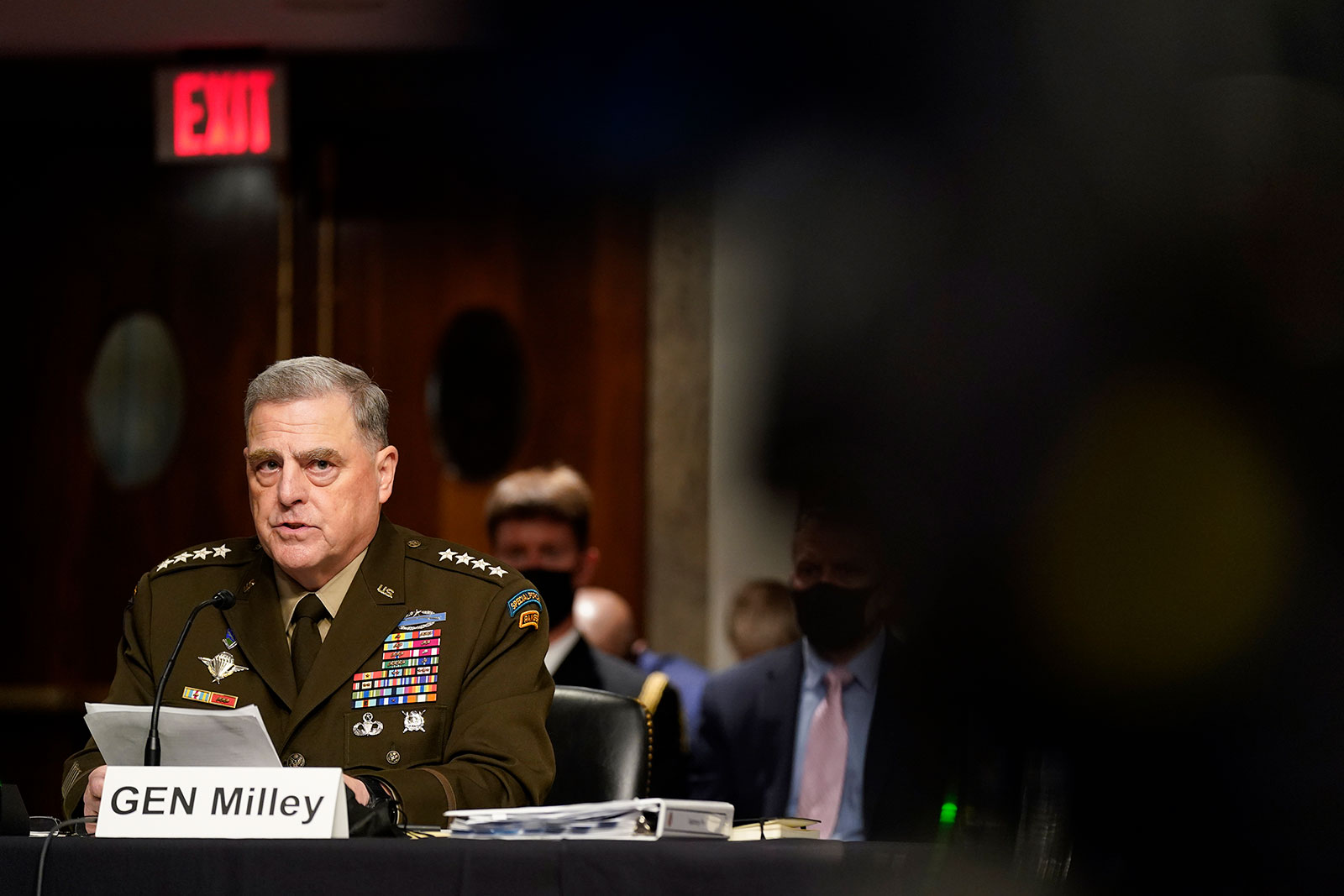
At the end of his remarks about Afghanistan, Gen. Mark Milley turned to calls he held in January and last October with his Chinese counterpart. He told lawmakers key Trump leaders and military officials were aware of the calls.
These calls have become a lightning rod for partisan criticism, with some Republicans calling for Milley’s resignation or firing. Milley said the calls were part of routine communications “with the knowledge and coordination of civilian oversight.”
“I am specifically directed to communicate with the Chinese by Department of Defense guidance,” he said.
Eight people sat in on the October call between Milley and his Chinese counterpart, while 11 people sat in on the January call, Milley said. The calls were coordinated with then-Secretary of Defense Mark Esper and then-Acting Secretary of Defense Christopher Miller.
“I personally informed both Secretary of State Pompeo and White House Chief of Staff Meadows about the call among other topics,” Milley said of the January call.
Milley continued: “These military-to-military communications at the highest level are critical to the security of the United States in order to deconflict military actions, manage crises, and prevent war between great powers that are armed with the world’s most deadliest weapons.”
He said that the calls were coordinated after the US Defense Department learned of specific intelligence “which caused us to believe the Chinese were worried about an attack on them by the United States.”
“I know, I am certain, that President Trump did not intend to attack the Chinese, and it is my directed responsibility, and it was my directed responsibility by the secretary to convey that intent to the Chinese,” Milley said.
He said that his task at the time was to “de-escalate” and that his message was consistent: “Stay calm, steady, and de-escalate. We are not going to attack you.”
Top US general: It’s “clear” that war in Afghanistan “did not end on the terms we wanted”
From CNN’s Adrienne Vogt
Joint Chiefs Chairman Gen. Mark Milley said it is “clear” that the Afghanistan war did not end in the way intended.
“It is clear — it is obvious — the war in Afghanistan did not end on the terms we wanted with the Taliban now in power in Kabul,” Milley told lawmakers during a Senate hearing on the withdrawal from Afghanistan.
Milley said that the threat of an attack from terrorist groups remains “a very real possibility.”
“We must remember that the Taliban was and remains a terrorist organization, and they still have not broken ties with Al Qaeda. I have no illusions who we are dealing with,” Milley said. “It remains to be seen whether or not the Taliban can consolidate power or if the country will further fracture into civil war. But we must continue to protect the United States of America and it people from terrorist attacks coming from Afghanistan. A reconstituted Al Qaeda or ISIS with aspirations to attack the United States is a very real possibility.”
Watch the moment:
Milley says he clearly warned Biden and Trump that quick withdrawal could lead to Afghan government collapse
From CNN’s Oren Liebermann
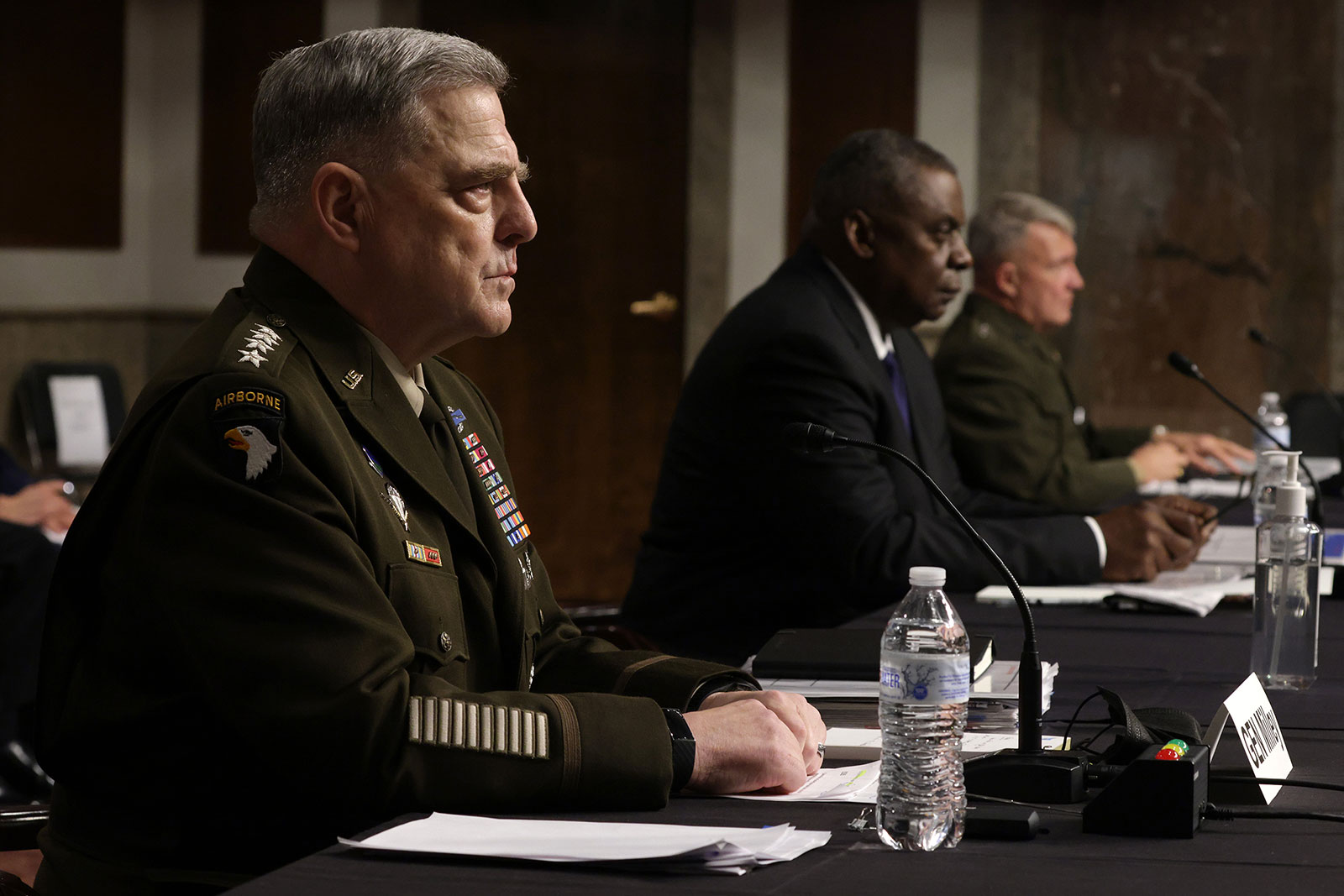
Chairman of the Joint Chiefs of Staff Gen. Mark Milley made clear in his opening statement of the warnings that military leaders, including himself, gave the Trump and Biden administrations.
A quick withdrawal, Milley says he told the White House in fall 2020, could lead to a collapse of the Afghan government and military, leading to a complete Taliban takeover.
Of the seven conditions placed on the Taliban in the Doha Agreement, signed in early 2020 between the Taliban and the Trump administration, only one was followed. The Taliban never attacked US forces following the agreement, but “failed to fully honor any other commitments,” Milley said.
“In the fall of 2020, my analysis was that an accelerated withdrawal without meeting specific and necessary conditions risks losing the substantial gains made in Afghanistan, damaging US worldwide credibility, and could precipitate a general collapse of the Afghan government, resulting in a complete Taliban takeover or general civil war,” Milley told lawmakers.
“My assessment remained consistent throughout,” he continued.
Milley said the Biden administration listened to the views of military leaders, giving them “serious consideration,” but Biden pushed forward with the withdrawal of all but 650 troops, which should have been required to secure the embassy in Kabul and Hamid Karzai airport.
Milley was blunt in his assessment of the future of Afghanistan under Taliban rule. “A reconstituted al Qaeda or ISIS with aspirations to attack the United States is a very real possibility,” Milley warned. “And those conditions … could present themselves in the next 12 to 36 months.”
Defense secretary reflects on the 20-year war: “We helped build a state…but we could not forge a nation”
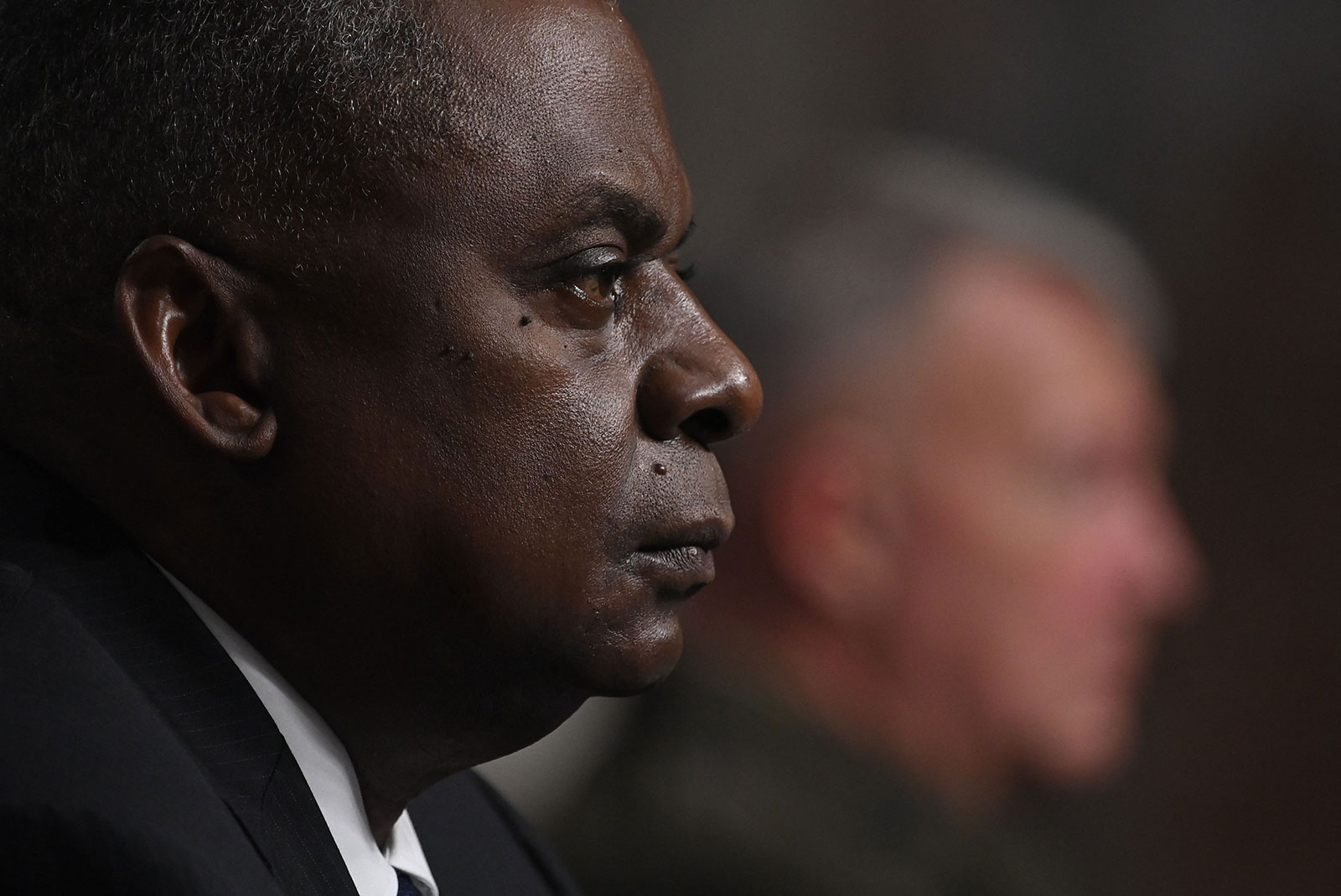
As he neared the end of his opening remarks, Defense Secretary Austin shifted his focus to the entire 20-year war, asking frankly if the US had the right strategy, if it believed falsely that it could build an Afghan government that would last and if it could create a self-sustaining Afghan military.
Austin admitted that the US never understood the problems on the ground in Afghanistan, including endemic corruption that undermined and delegitimized the exact government the US was supporting.
“We need to consider some uncomfortable truths: that we did not fully comprehend the depth of corruption and poor leadership in their senior ranks, that we did not grasp the damaging effect of frequent and unexplained rotations by President Ghani of his commanders, that we didn’t anticipate the snowball effect caused by the deals that Taliban commanders struck with local leaders in the wake of the Doha agreement, and that the Doha agreement itself had a demoralizing effect on Afghan soldiers. And finally, that we failed to fully grasp that there was only so much for which – and for whom – many of the Afghan forces would fight.”
The collapse of the Afghan army in the face of a Taliban offensive “took us all by surprise,” Austin said.
“We helped build a state, Mr. Chairman, but we could not forge a nation,” he added.
CNN’s Oren Liebermann contributed reporting to this post.
Secretary of defense defends planning for Afghanistan withdrawal: “We wanted to be ready, and we were”
From CNN’s Oren Liebermann
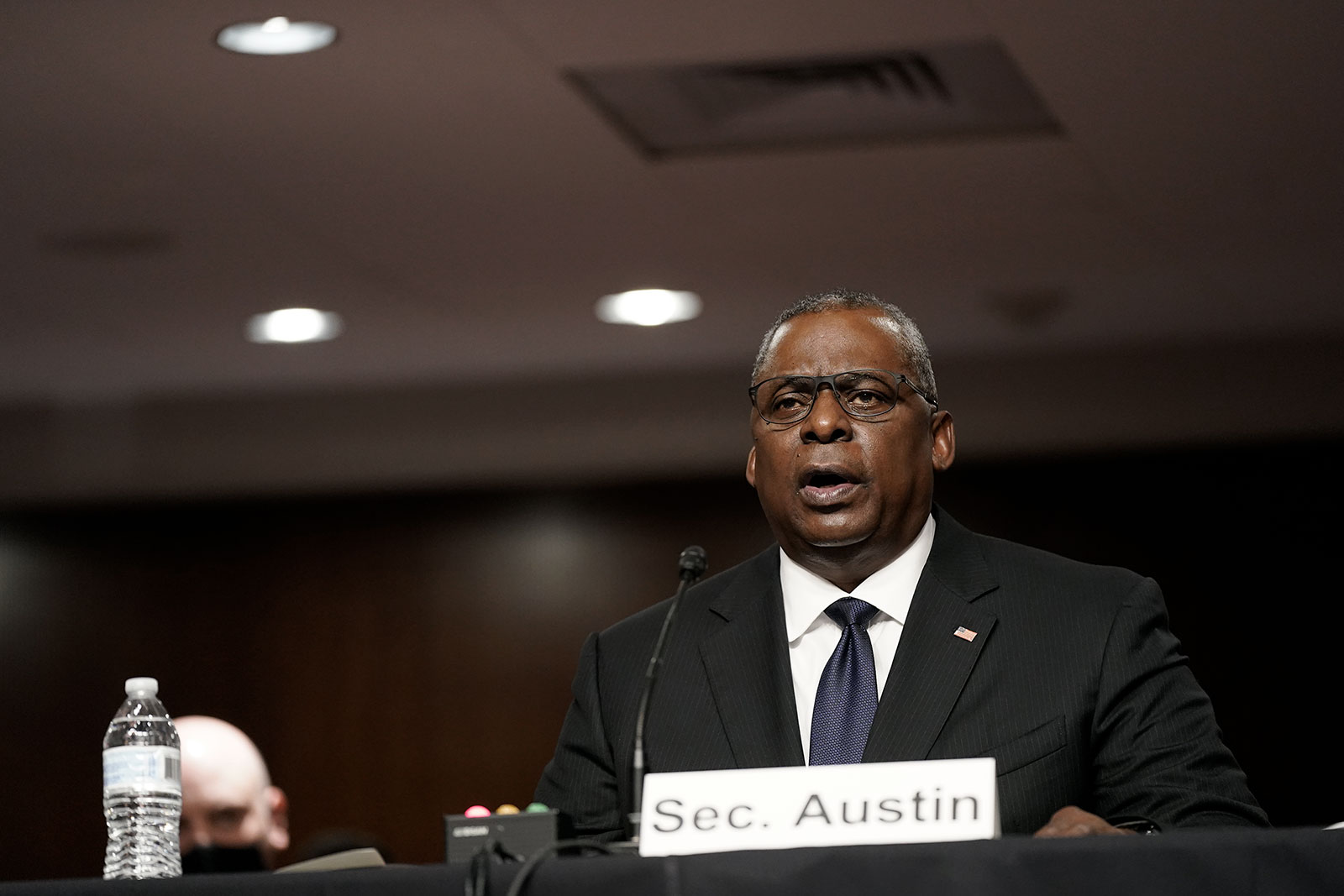
In his opening remarks, Secretary of Defense Austin emphasized the planning that preceded the evacuation from Afghanistan and the positioning of forces that allowed troops to arrive in Kabul fairly quickly as the evacuation began.
As early as spring, the Pentagon began thinking about the possibility of a non-combatant evacuation and preparing for a number of scenarios, Austin told lawmakers. By early June, Austin pre-positioned forces in the region, he said, including three infantry battalions.
“We wanted to be ready, and we were,” he said.
Although the first two days of the evacuation were “difficult,” Austin acknowledged, US troops restored order in 48 hours, and the herculean effort to move tens of thousands of American citizens and at-risk Afghans began in earnest.
“We all watched with alarm the images of Afghans rushing the runway and our aircraft. We all remember the scenes of confusion outside the airport,” Austin said.
The secretary of defense went on to outline where things stand now.
“We are still working to get Americans out who wish to leave,” Austin said, though it is now the job of the State Department and the interagency, not the military.
Lawmakers have repeatedly criticized the Biden administration for concluding the military evacuation and withdrawal from Afghanistan while there were still American citizens who wanted to leave the country, in addition to the inability of the administration to say just how many Americans are left in Afghanistan.
On Monday, a senior State Department official said the department is working to get out approximately 100 US citizens and Afghan green card holders from Afghanistan, but there was no indication of when it might happen or by what route they would leave the country.
“Even with no military presence on the ground, that part of our mission is not over,” Austin said.
Defense secretary says the Afghanistan evacuation was “the largest airlift conducted in US history”
US Defense Secretary Lloyd Austin provided the Senate committee with the military’s latest numbers on the evacuation effort in Afghanistan.
“We planned to evacuate between 70,000-80,000 people. They evacuated more than 124,000,” he said. “We planned to move between 5,000-9,000 people per day. On average, they moved slightly more than 7,000 per day.”
Austin said that more than 387 US military aircraft departed from the region during the evacuation, averaging nearly 23 per day. “At the height of this operation, an aircraft was taking off every 45 minutes,” he said.
“It was the largest airlift conducted in US history, and it was executed in 17 days,” he said.
Austin conceded that the operation was not perfect: “We moved so many people so quickly out of Kabul that we ran into capacity and screening problems at intermediate staging bases outside of Afghanistan,” he said.
He said that the military is still working to get Americans and Afghan allies out who wish to leave the country.
Defense secretary Austin to defend Biden administration’s handling of withdrawal from Afghanistan
From CNN’s Oren Liebermann
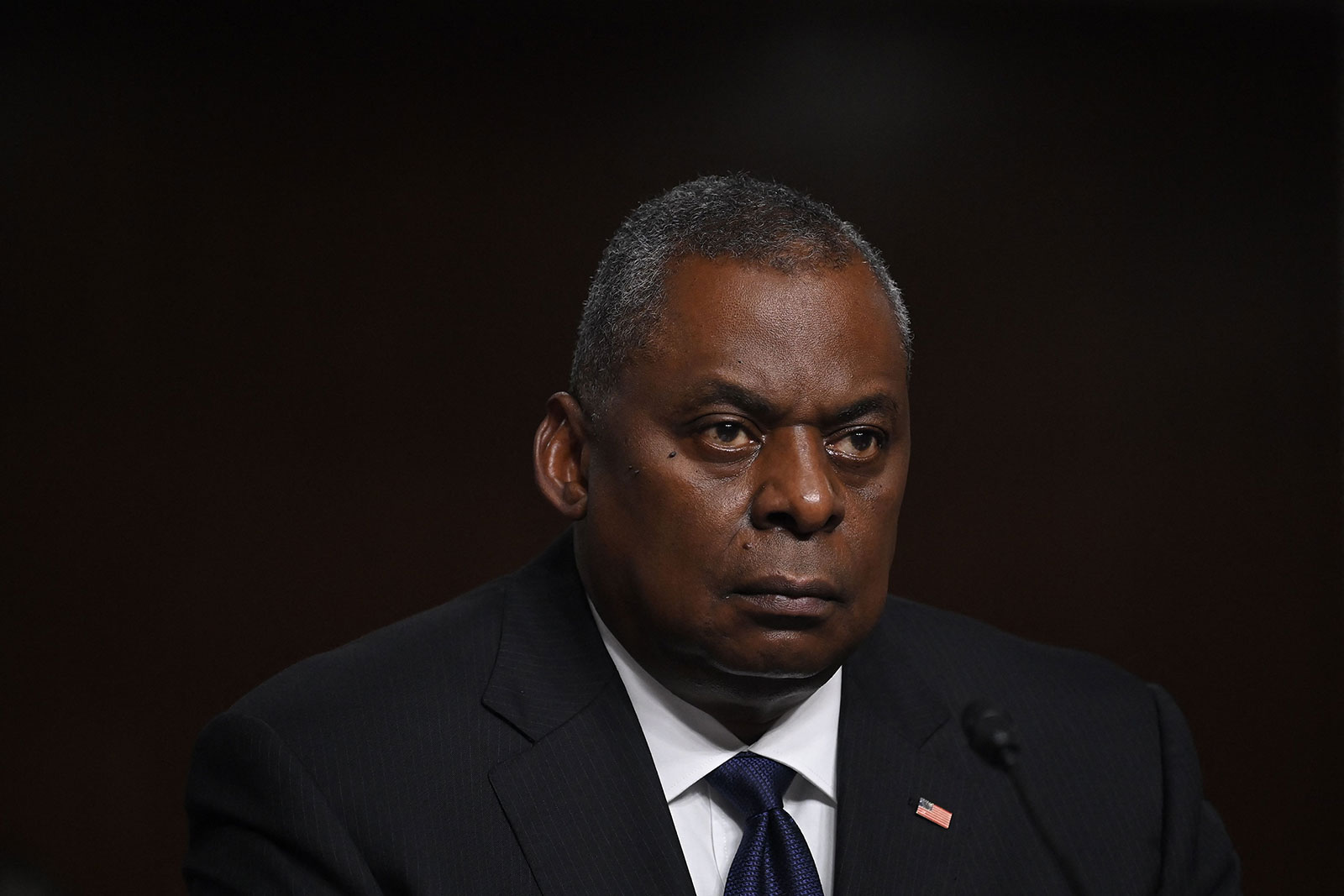
Defense Secretary Lloyd Austin will defend the Biden administration’s handling of the withdrawal from Afghanistan, along with the planning and decision making throughout the planning and execution process, a senior defense official said.
During today’s Senate hearing, Austin will stress that President Biden listened to the Defense Department’s views during interagency discussions in a normal, though somewhat accelerated decision making process, the official said.
One day after visiting a military base housing thousands of Afghan evacuees, Austin will acknowledge some mistakes and shortcomings at the beginning of the evacuation, the official said, but will argue that the non-combatant evacuation operation was largely a success, pointing to the movement of 124,000 people in a little more than two weeks.
Austin is also set to acknowledge the mistakes made in connection with the Aug. 29 drone strike that killed 10 Afghan civilians, including 7 children, said the official.
Even so, he will defend the Pentagon’s plan for “Over the Horizon” operations, in which the military will carry out strikes in Afghanistan, when needed, from airfields outside the country.
NOW: Senate hearing on Afghanistan withdrawal begins

The Senate Armed Services Committee hearing on the US withdrawal from Afghanistan has started, and President Biden’s top military leaders are set to testify soon.
The witnesses are:
- Secretary of Defense Lloyd Austin
- Chairman of the Joint Chiefs Gen. Mark Milley
- Leader of US Central Command Gen. Frank McKenzie
Today’s hearing marks the first time the military leaders are testifying publicly since the full withdrawal took place.
All three officials are expected to face questions about the chaotic nature of the withdrawal, be pressed to explain the Biden administration’s plan for conducting counter-terrorism missions in the country going forward and be called upon to answer for the failures that led to a drone strike killing 10 civilians.
Read more about today’s hearing here.
Committee chairman: “We need to understand why and how” Afghan state failed and Taliban retook control
From CNN’s Nicole Gaouette
Democratic Sen. Jack Reed, chairman of the Senate Armed Services Committee, has released his opening statement ahead of today’s hearing.
He says: “After nearly 20 years of war, enormous sacrifice by American and coalition military, diplomatic, and intelligence personnel, and vast U.S. investment, the Afghan state has failed and the Taliban has retaken control. We need to understand why and how.”
He says the committee will examine events surrounding the withdrawal but also urges members to examine missteps over the 20-year history of the war.
“I think it is equally important, however, that this Committee takes a step back and examines the broader two-decade mission that shaped the outcome we face today,” Reed is expected to say.
“Our withdrawal this summer and the events surrounding it did not happen in a vacuum. The path that led to this moment was paved with years of mistakes, from our catastrophic pivot to Iraq, to our failure to handle Pakistan’s support for the Taliban, to the flawed Doha Agreement signed by President Trump.”
Source: http://rss.cnn.com/~r/rss/cnn_topstories/~3/mnWwpEql3qk/h_61275d737f9d6c6bad389137d0230ecb
















